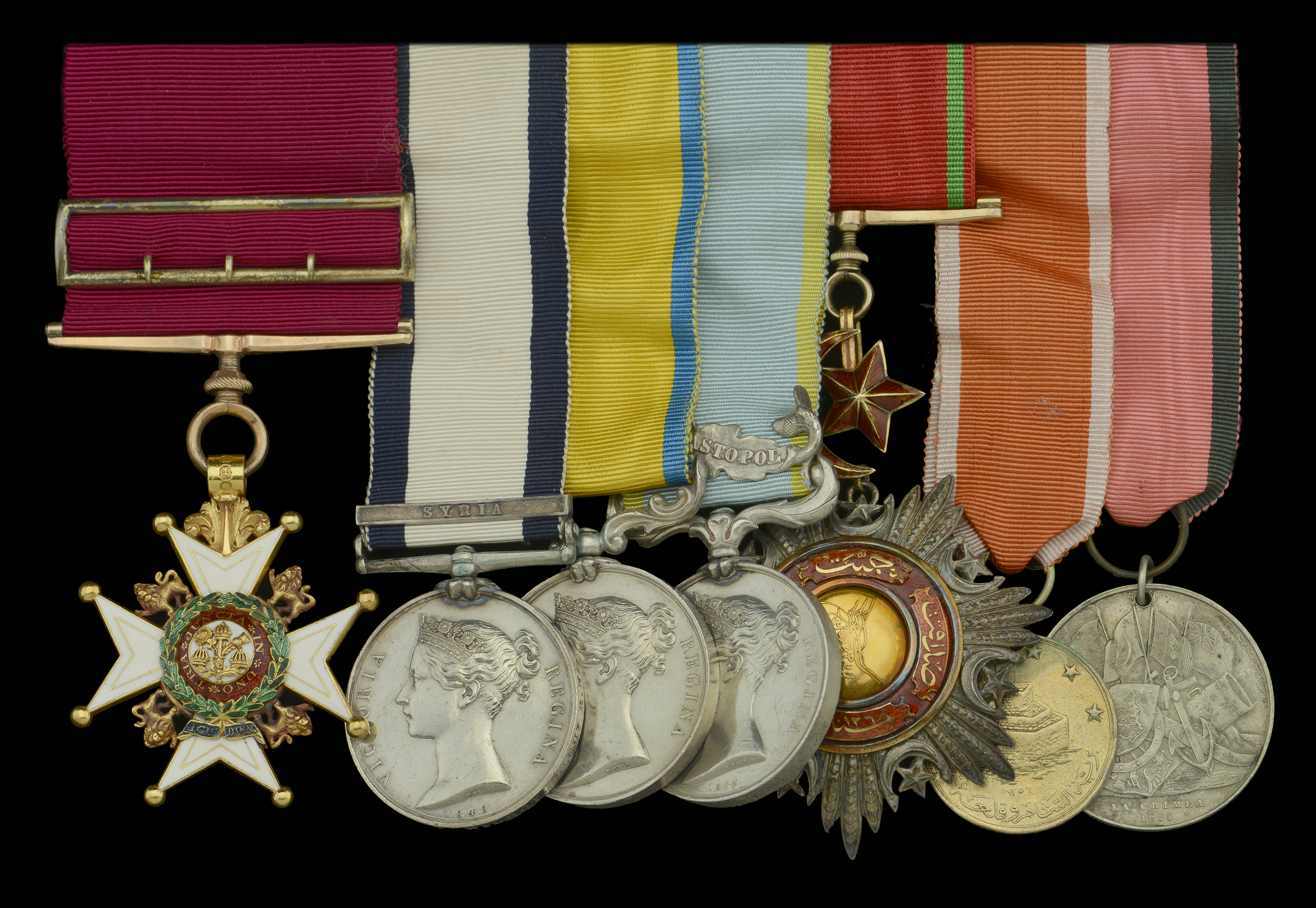A Crimean War C.B. group od seven awarded to Vice Admiral Arthur Parry Eardley-Wilmot, C.B., Royal Navy The Most Honourable Order of the Bath, C.B. (Military) Companion’s breast badge, 22 carat gold and enamels, hallmarked London 1815, maker’s mark ‘TD’ over ‘HD’ for Thomas and Henry Davies, fitted with later silver-gilt ribbon buckle; Naval General Service 1793-1840, 1 clasp, Syria (A. P. E. Wilmot, Lieut. R.N.); Baltic 1854-55, unnamed as issued; Crimea 1854-56, 1 clasp, Sebastopol, unnamed as issued; Ottoman Empire, Order of the Medjidie, 3rd Class neck badge converted for breast wear, silver, gold and enamel; St. Jean d’Acre 1840, silver-gilt; Turkish Crimea, Sardinian issue, the first with one or two very minor blemishes to enamel, light contact marks but generally good very fine (7) £4,000-£5,000 --- Importation Duty This lot is subject to importation duty of 5% on the hammer price unless exported outside the UK --- --- Arthur Parry Eardley-Wilmot was born in April 1815, the fourth son of Sir John Eardley-Wilmot, Bart., M.P. for Warwickshire, and Governor of Van Diemen's Land, and entered the Royal Naval College in 1828. He joined H.M.S. Wolf, fitting for the East Indies, in 1830 as a 1st Class Volunteer, and subsequently saw active service against the Malay Pirates and in the blockade of the fortress of Quedah. In 1832 he was at Canton when the Chinese 'first displayed the symptoms of insolence and aggression'. He returned to England in October of the latter year as Midshipman in the Crocodile, and next joined Sir William Parker's Flagship, Asia, at Lisbon where he witnessed the expulsion of Don Miguel from Portugal during the Civil War with Don Pedro. Having passed for Mate in 1833, he visited 'the South Sea Islands, protecting British interests in the Sandwich Islands, the missionary interests at Marquesas, and the peace and good order in the Rio de la Plata'. During this latter commission a group of islands was discovered and named after the Actaeon. Promoted Lieutenant in July 1840, he was appointed to the Powerful the following November, and, under Commodore Sir Charles Napier, served off Syria and in the blockade of Alexandria. In the Wolverine he sailed for China, and was employed at the close of the Opium War in the blockade of the Canton River. He then served as Flag-Lieutenant to William Parker in the Cornwallis on the East Indies Station and in the Hibernia in the same capacity in the Mediterranean. Advanced to Commander in 1847 he was nominated acting Captain of the Spartan off the coast of Syria and then second Captain of the Superb. In 1851 he was appointed Commander of the Brig Harlequin, and, as there was no standard uniform for sailors at that time, he followed the lead of other Captains who dressed their crew, particularly the crew of the gig boats, according to their own taste. Wilmot's gig, manned by 'multi-coloured Harlequins', was consequently never hard to make out. In the Harlequin Wilmot distinguished himself in anti-slavery operations on the coast of West Africa, where he made several treaties, and subsequently received from the King of Dahomey, as 'a tribute of esteem and friendship', an ornamental purple velvet Cap and Silver Staff in the form of an alligator Fetish. In December 1853 The Illustrated London News wrote of this prize, 'The Staff is an emblem of high rank, and gives to the possessor the title of Great Chief. Whenever the person carrying the Staff is seen, the natives fall prostrate upon the ground, and, according to the homage paid to Royalty, throw dirt over their heads ...' Promoted Captain in 1854, Wilmot went aboard the Royal William (Captain Kingcome) as a volunteer for operations in the Baltic ending with the capture of Bomarsund. At Fort Nott, 'owing to the truce having expired', he was taken prisoner but the Russians chivalrously agreed to release him and he returned home in the Royal William to take command of the Paddle Steamer Sphinx, destined, with a cargo of ammunition and explosives, for Sebastopol. Commended in numerous despatches and created a C.B. for services in the Crimea, especially for organising the expedition to Kertch and superintending the landing of the Turkish army at Eupatoria. He was appointed in 1862 Captain of the wooden Corvette Rattlesnake, in which he was instructed to hoist the Broad Pennant of Commodore on the West Coast of Africa, where he spent the next four years stamping out the slave trade. On his return to England he was nominated a Naval A.D.C. and appointed Superintendent of Deptford Dockyard until his promotion to Rear-Admiral in 1870. On 2 October of that year he was appointed Second-in-Command of the Channel Fleet under Admiral Wellesley and hoisted his flag on board the Agincourt. In 1871 during a visit to Gibraltar, the Agincourt, leading the inshore Squadron, ran on the Pearl Rock and became stranded, causing considerable comment and controversy at the time. The mishap proved 'a deathblow' to Wilmot's seagoing career, and he retired as Vice-Admiral on 18 June 1876. He was author of The Midshipman’s Friend, or Hints from the Cockpit, 1845; Manning the Navy, 1849; and Complete and Universal Dictionary of Signals, 1849. He died at Torquay on 2 April 1886.


